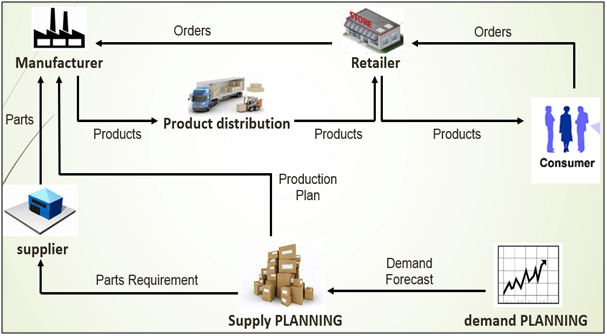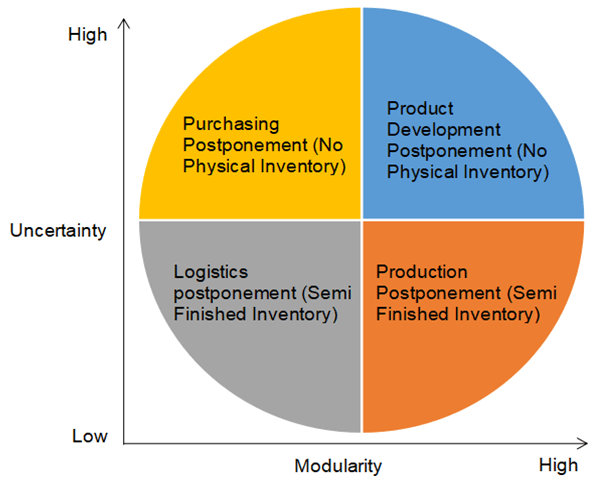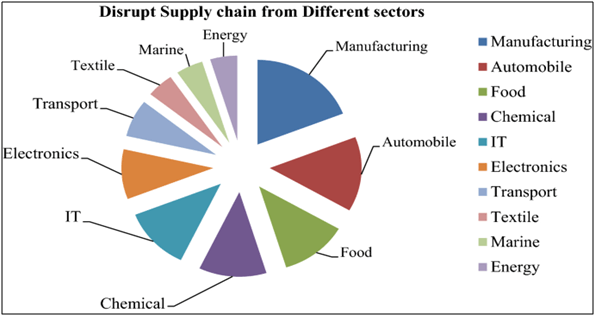Effective management of a supply chain includes thinking creatively about the way of integrate and perform logistics and manufacturing activities. Postponement and speculation strategies of products during a timely and cost-effective manner by the standard production and logistics structures. Supply chain have reducing risk and forecasting techniques, cooperation and integration between the manufacturing and logistics processes.

Businesses that depend on high volumes of easily accessible stock as a part of their operation, in-house warehousing is not usually an option. Cost effective route is that the utilisation of off-site warehousing, but finding the proper company is crucial to the on-going continuity of supply and distribution.

Table of Contents
Incorporating Postponement Strategies
In the short life cycle era, many companies struggle to survive by increasing their product spectrum to realize more market share. Pressure of such competitive environment including the problem of forecast, the planning of products tends to use the concept of modularity and postponement strategy in supply chain management. The environmental uncertainty profiles is developed to research postponement, speculation and hybrid strategies with diverse system properties to match the value effect incurred. Accordingly, the maker can utilize this model to work out which postponement strategy should be adopted to succeed in better performance.
- Purchasing Postponement, which refers to the delayed purchase of high-priced and fragile materials or components.
- Product Development Postponement, which refers to the market demand for lower-cost products, increased pressure to fulfill delivery deadlines, Particular interest, market demand and feature-rich products.
- Logistics Postponement, which refers to maintaining a full-line of anticipatory inventory at one or a number of strategic locations. Products are often customized quickly in production facilities getting ready to customers.
- Production Postponement, which refers to the development in addition as production strategy by considering demand and provide sides.

Postponement in Manufacturing and Supply Chain
Specialized processes or components are to customize the work-in-process, which was a standard (generic) product up to point within the process, into the various end-products. now is referred as point of product differentiation. Postponement refers to redesigning the method to delay the purpose of differentiation. There are typically two stages in the supply chain for differentiation. The first is to occur at an early stage or early level of postponement and the second is to take place at a later stage, or late level of postponement.
Implementing Postponement Strategies
Postponement is employed to realize customization and efficiency within one OS. Integration of the flow of data is required to realize a seamless integration of functions and therefore the sizable amount of (outside) companies involved within the physical sphere.Managing supply-chain integration, such as mass customization, postponement and modularization. While the goal of mass customization is to supply customized goods at low costs, postponement strategy focuses on delaying customization as on the point of the purchasers as possible. The customization and postponement of products architecture designs. Product customization can happen either supported a standard platform with additional options or supported combining and mixing-and-matching modules to realize different product characteristics. Strategy to facilitate assembly, logistics and outsourcing. Analyses of ‘modularization characteristic curve’, opportunities for modularization and interface constraints, which represent the mixture effect from interface compatibility effects, component customization, value inputs and supplier–buyer interdependence. Managerial implications of those strategies are discussed.
Postponement in Processing
Involves the delay of ultimate manufacturing until a customer order is received and is usually considered an approach to mass customization. This Customer Order Decoupling Point (CODP) would be better located further upstream within the manufacturing process.

Postponement in Supply Chain
In modeling postponement, most researchers specialise in the manufacturing postponement; whereas this study extends it to the postponement of supply chain operations, namely, manufacturing, packaging, and logistics. Professional digital equipment and software system to supply chain as an example to model the optimal combinations among these operations’ postponement. The function of management tool to the optimal supply chain operations for postponements into consideration.

Postponement in Logistics
logistic postponement refers to when a corporation delays one or more of the ultimate steps of manufacturing a product until it’s been purchased. While doing this, logistic postponement helps companies keep their costs down by saving the last expensive step of customization until the top, after a purchase has been completed.The most important element of supply chain management in an uncertain environment should be keeping track of even weak signals which will disrupt chain operations.
The full content is only visible to SIPMM members
Already a member? Please Login to continue reading.

